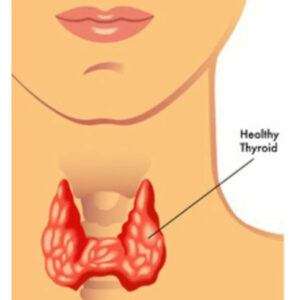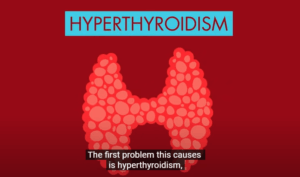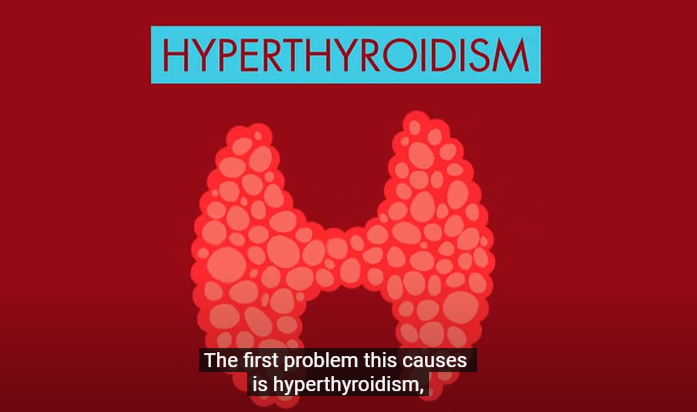Abnormal Thyroid Symptoms – Unexplained Weight Gained Or Lost
As an Amazon affiliate I earn from qualifying purchases at NO extra cost to You.
The thyroid, a small butterfly-shaped gland located at the base of the neck, plays a crucial role in regulating metabolism, energy levels, and overall well-being. In females, thyroid symptoms in females are particularly common. There is an estimated one in eight women developing a thyroid problem during her lifetime. 
Thyroid Symptoms in Females
Thyroid symptoms in females manifest through a variety of symptoms that are often subtle and easily overlooked, leading to delayed diagnosis and treatment. Recognizing the signs and symptoms of thyroid dysfunction is essential for prompt intervention and maintaining optimal health.
This article will explore the most common thyroid symptoms experienced by females, helping readers understand when to seek medical attention and take proactive steps towards managing their thyroid health.
The thyroid gland, a small butterfly-shaped organ located in the neck, plays a vital role in overall health and well-being. For women, in particular, the importance of thyroid function cannot be overstated. This introduction explores the significant impact of the thyroid on women’s health, highlighting its far-reaching effects on various aspects of female physiology and quality of life.
The Role of the Thyroid in Women’s Health
- The thyroid gland produces hormones that regulate metabolism, energy levels, body temperature, and other vital functions
- Thyroid hormones play a crucial role in menstrual cycles, fertility, pregnancy, and postpartum health.
- Women are more susceptible to thyroid disorders than men, with a prevalence ratio of 5 to 1.
- Thyroid dysfunction leads to various health issues, including weight fluctuations, mood changes, fatigue, and reproductive problems.
Understanding the profound influence of thyroid function on women’s health is essential for both healthcare providers and women themselves. By recognizing the signs of thyroid disorders and seeking appropriate care, women can take proactive steps to maintain optimal thyroid health and overall well-being.
Thyroid disorders are a group of medical conditions that affect the function and structure of the thyroid gland, a vital endocrine organ responsible for regulating metabolism, growth, and development.
These disorders disproportionately affect women, with a significant impact on their overall health and well-being. Understanding the prevalence and types of thyroid disorders is crucial for early detection, proper diagnosis, and effective management. This overview highlights the most common thyroid conditions observed in women, their prevalence, and underlying causes.
Prevalence and Types of Thyroid Disorders
- Hypothyroidism (underactive thyroid) is the most common thyroid disorder in women, affecting about 2% of the female population
- Hashimoto’s thyroiditis, an autoimmune condition, is the leading cause of hypothyroidism in women.
- Hyperthyroidism (overactive thyroid) affects about 1% of women, with Graves’ disease being the most common cause.
- Postpartum thyroiditis occurs in about 5-10% of women within the first year after giving birth. It causes temporary hyperthyroidism followed by hypothyroidism.
- Thyroid nodules are more common in women, with a prevalence of 5-10% in the general female population
Early Thyroid Symptoms and Diagnosis
Early recognition and diagnosis through regular screening and appropriate treatment are essential for preventing complications and ensuring optimal health outcomes for women with thyroid disorders. Keep in mind the following details:
- Thyroid disorders are difficult to diagnose due to their non-specific symptoms, which may overlap with other health issues.
- Regular thyroid function screening is essential for women, especially those with a family history of thyroid disorders or autoimmune diseases
- Thyroid function tests (TSH, T3, and T4) are crucial for diagnosing and monitoring thyroid disorders.
- Early diagnosis and appropriate treatment prevents complications and improves overall health outcomes.
- Untreated thyroid disorders during pregnancy leads to increased risks of miscarriage, preterm birth, and developmental issues in the child.
- Monitoring thyroid function is essential for women undergoing hormone replacement therapy or taking medications that affect thyroid function.
Understanding thyroid function and disorders is crucial for women’s health due to the high prevalence of thyroid issues among females and the significant impact on various aspects of their well-being. 
The Most Common Thyroid Symptoms in Women
The thyroid gland plays a crucial role in regulating various bodily functions. When it malfunctions, it leads to a wide range of symptoms. Women are more likely to experience thyroid disorders than men.
This makes it more essential for them to recognize the common signs and symptoms. By being aware of these indicators, women are able to seek timely medical attention and receive appropriate treatment. In addition, check out a PDR when you get a chance.
Here is a detailed list of common thyroid symptoms in women:
1. Fatigue and weakness
2. Unexplained weight changes (gain or loss)
3. Sensitivity to cold or heat
4. Dry skin and hair
5. Thinning hair or hair loss
6. Muscle aches and joint pain
7. Constipation or diarrhea
8. Mood changes, such as depression or irritability
9. Memory and concentration issues
10. Enlarged thyroid gland (goiter)
11. Irregular or heavy menstrual periods
12. Difficulty conceiving or recurrent miscarriages
13. Sleep disturbances
14. Rapid or slow heartbeat
15. Tremors in the hands and fingers
Hypothyroidism Versus Hyperthyroidism Symptoms
Thyroid disorders are broadly classified into two categories: hypothyroidism (underactive thyroid) and hyperthyroidism (overactive thyroid). While some symptoms may overlap, there are distinct differences between the two conditions. [lasso id=”12587″ link_id=”1028″ ref=”amzn-2017-physicians-desk-reference-71st-edition”]
Hypothyroidism Symptoms
- Fatigue and lethargy
- Unexplained weight gain
- Sensitivity to cold
- Dry skin and hair
- Constipation
- Depression and memory issues
- Nervousness and anxiety
- Unexplained weight loss
- Sensitivity to heat
- Increased sweating
- Frequent bowel movements or diarrhea
- Rapid heartbeat and tremors
Recognizing these specific symptoms helps women and their healthcare providers determine the type of thyroid disorder they are experiencing, leading to more targeted treatment options.
Impact on Menstrual Cycle and Fertility
Thyroid disorders significantly impact a woman’s menstrual cycle and fertility. Hypothyroidism causes irregular, heavy, or prolonged menstrual periods, while hyperthyroidism leads to shorter, lighter, or more frequent periods. However, both conditions contribute to fertility issues.
Women With Hypothyroidism Experience
- Oligomenorrhea (infrequent menstrual periods)
- Amenorrhea (absence of menstrual periods)
- Menorrhagia (heavy menstrual bleeding)
- Increased risk of early miscarriage
- Difficulty conceiving due to ovulatory dysfunction
Women With Hyperthyroidism Face
- Polymenorrhea (frequent menstrual periods)
- Hypomenorrhea (light menstrual bleeding)
- Anovulatory cycles (menstrual cycles without ovulation)
- Increased risk of complications during pregnancy
It is crucial for women experiencing menstrual irregularities or fertility issues to have their thyroid function evaluated. Proper management of thyroid disorders often improves these concerns.
In conclusion, recognizing the common thyroid symptoms in women is vital for early detection and treatment of thyroid disorders. Understanding goes a long way.
To stay ahead of the game, women will have all of the following:
- Understand both hypothyroidism and hyperthyroidism.
- Being aware of the impact on menstrual cycles and fertility. (Get a home test kit)
- Be able to take steps to maintain their thyroid health.
Interpreting Subtle Thyroid Symptoms in Females
Many women experience symptoms of thyroid dysfunction that go unrecognized or are attributed to other factors like stress, aging, or menopause. It is important to be aware of the subtle signs that your thyroid may be out of balance, as early detection and treatment greatly improve quality of life.
Physical Symptoms That Go Unnoticed
Some physical symptoms of thyroid issues are so common and non-specific that they are easy to overlook. Fatigue is a classic sign, but it’s often chalked up to a busy lifestyle. Unexplained weight changes, either gain or loss, occur despite no changes in diet or exercise habits.
Dry skin, brittle nails, and thinning hair are often dismissed as normal aging. Sensitivity to cold or heat, muscle aches, weakness, and digestive changes like constipation all be clues that your thyroid is struggling. Heavier than normal or irregular menstrual periods can also result from thyroid dysfunction.
Psychological and Emotional Signs of Thyroid Imbalance
Thyroid disorders have a significant impact on mental health and emotions too. Depression, anxiety, mood swings, and difficulty concentrating are common psychiatric symptoms that women may not realize are thyroid-related. Low thyroid function makes you feel apathetic, unmotivated, and mentally foggy.
Conversely, an overactive thyroid causes restlessness, anxiety, irritability, and sleep disturbances. These symptoms are often attributed to stress or hormonal changes, but it’s important to consider if they are actually due to a thyroid condition.
The Importance of Listening to Your Body’s Cues
Pay attention to your body and trust your intuition if something feels “off.” Don’t brush off persistent, unexplained symptoms. Keep track of your symptoms and relay them to your doctor. Try to be as active as you can. Invest in an active lifestyle if possible. Walking is a great place to start. Just be sure to wear comfortable walking shoes.
Thyroid-Stimulating Hormone
The Thyroid-Stimulating Hormone (TSH) is a hormone produced by the anterior pituitary gland in the brain. Its primary function is to regulate the production and release of thyroid hormones, triiodothyronine (T3) and thyroxine (T4), from the thyroid gland.
Here are some key points about TSH:
1. Function:
TSH stimulates the thyroid gland to produce and secrete T3 and T4, which are essential for regulating metabolism, growth, and development in the body.
2. Feedback loop:
The production of TSH is regulated by a negative feedback loop involving the hypothalamus, pituitary gland, and thyroid gland. When thyroid hormone levels are low, the hypothalamus releases thyrotropin-releasing hormone (TRH), which stimulates the pituitary to produce more TSH. Conversely, when thyroid hormone levels are high, TSH production is suppressed.
3. Diagnostic tool:
Measuring TSH levels in the blood is a common way to assess thyroid function. High TSH levels indicates an underactive thyroid (hypothyroidism), while low TSH levels may suggest an overactive thyroid (hyperthyroidism).
4. Reference range:
The normal reference range for TSH varies slightly between laboratories, but it typically falls between 0.4 and 4.0 mIU/L (milliunits per liter).
5. Disorders:
Abnormal TSH levels is associated with various thyroid disorders, such as Hashimoto’s thyroiditis, Graves’ disease, and thyroid nodules, as well as pituitary gland disorders that affect TSH production.
Understanding the role of TSH is crucial for maintaining proper thyroid function and overall health. Healthcare professionals often use TSH tests in conjunction with other thyroid function tests to diagnose and monitor thyroid disorders.
Advocate for yourself and request a full thyroid panel if you suspect an issue. TSH is often the only thyroid marker routinely tested, but it doesn’t always tell the whole story.
Be sure to have your free T3, free T4, and thyroid antibodies checked as well for a complete picture of your thyroid health. Remember, you know your body best. If your symptoms are impacting your quality of life, don’t hesitate to seek answers and treatment.
With proper care, thyroid disorders are very manageable, and you can get back to feeling like yourself again.
Navigating Thyroid Tests and Diagnosis:
Empowering Women with Knowledge
Thyroid disorders are more common in women than men. This why it’s crucial for women to understand the importance of thyroid health. By familiarizing themselves with the process of thyroid testing, interpreting results, and advocating for their well-being, women take control of their thyroid health journey.
The Process of Thyroid Testing
Thyroid testing typically begins with a blood test that measures the levels of thyroid-stimulating hormone (TSH) and thyroid hormones, such as thyroxine (T4) and triiodothyronine (T3).
TSH is produced by the pituitary gland and regulates the production of thyroid hormones. If TSH levels are high, it indicates an underactive thyroid (hypothyroidism), while low TSH levels suggest an overactive thyroid (hyperthyroidism).
In addition to TSH, free T4 and free T3 levels are often measured to provide a more comprehensive picture of thyroid function. Antibody tests, such as thyroid peroxidase antibodies (TPO) and thyroglobulin antibodies (TgAb), are also performed to check for autoimmune thyroid disorders like Hashimoto’s thyroiditis or Graves’ disease.
Understanding your test results is essential for making informed decisions about your health. Reference ranges for thyroid hormones vary slightly between laboratories, so it’s important to discuss your results with your healthcare provider.
They help you interpret the numbers in the context of your overall health, symptoms, and medical history.
When to Consult a Healthcare Professional
Women need to consult their healthcare professional if they experience symptoms that indicate a thyroid disorder.
Some common signs of hypothyroidism include all the following:
- Fatigue
- Weight gain
- Cold sensitivity
- Dry skin
- Hair loss
- Constipation
Symptoms of Hyperthyroidism
Symptoms of Symptoms of hyperthyroidism include unexplained weight loss, rapid heartbeat, increased sweating, anxiety, and irritability.
Family History of Thyroid Disorders
It’s also advisable to have your thyroid function tested if you have a family history of thyroid disorders, as they are a genetic component. Women who are pregnant or planning to become pregnant should discuss thyroid testing with their healthcare provider. Thyroid hormones play a crucial role in fetal development.
Regular check-ups with your healthcare provider helps monitor your thyroid health over time. If you have a diagnosed thyroid condition, your doctor will recommend periodic testing to ensure your treatment plan is effective and to make any necessary adjustments.
Advocating for Your Health
Questions to Ask Your Doctor
When discussing thyroid health with your healthcare provider, it’s important to ask questions and advocate for your well-being
Some key questions to consider include:
1. What do my thyroid test results mean, and how do they compare to the reference ranges?
2. Based on my results and symptoms, do you suspect a specific thyroid disorder?
3. What are the potential treatment options for my condition, and what are the benefits and risks of each?
4. How often should I have my thyroid function tested, and what signs or symptoms should I watch for between check-ups?
5. Are there any lifestyle changes, such as diet or exercise modifications, that may help manage my thyroid health?
6. Can my thyroid condition affect my fertility or pregnancy, and what precautions should I take?
Remember, you are your own best advocate when it comes to your health. Don’t hesitate to ask questions, express concerns, and seek clarification from your healthcare provider. By working together and staying informed, you can effectively manage your thyroid health and maintain overall well-being.
Living Well with Thyroid Imbalances:
Management and Lifestyle
Thyroid disorders, such as hypothyroidism and hyperthyroidism, are more common in women than men. These conditions can significantly impact a person’s quality of life, causing symptoms like fatigue, weight changes, mood swings, and difficulty regulating body temperature.
However, with proper management and lifestyle adjustments, women with thyroid imbalances can lead healthy, fulfilling lives.
Treatment Options for Thyroid Disorders
The treatment for thyroid disorders depends on the specific condition and its severity. For hypothyroidism, the most common treatment is synthetic thyroid hormone replacement therapy, such as levothyroxine.
This medication helps restore normal thyroid hormone levels, alleviating symptoms. In cases of hyperthyroidism, treatment options include antithyroid medications (like methimazole or propylthiouracil), radioactive iodine therapy, or in some cases, thyroid surgery.
It’s essential for women to work closely with their healthcare provider to determine the most appropriate treatment plan based on their individual needs and medical history.
Lifestyle Changes to Support Thyroid Health
In addition to medical treatment and lifestyle modifications may help women manage their thyroid disorders more effectively. Maintaining a balanced, nutrient-rich diet is crucial. Foods high in iodine, selenium, and zinc, such as seafood, Brazil nuts, and whole grains, can support thyroid function.
Avoid Iodine Intake
However, it’s important to note that excessive iodine intake sometimes worsen thyroid issues, so it’s best to consult with a healthcare professional before making significant dietary changes.
Regular Exercise
Regular exercise is another essential aspect of managing thyroid disorders. Engaging in physical activity can help boost energy levels, improve mood, and maintain a healthy weight. Low-impact exercises like walking, swimming, or yoga can be particularly beneficial for women with thyroid issues who may experience joint pain or fatigue.
Stress Management
Stress management is also key, as chronic stress can negatively impact thyroid function. Incorporating stress-reducing techniques like meditation, deep breathing exercises, or engaging in hobbies can help promote overall well-being.
Resources and Support Groups
Living with a thyroid disorder can be challenging, but women need not face these challenges alone. There are numerous resources and support groups available to help women navigate their thyroid health journey.
The American Thyroid Association
Organizations like the American Thyroid Association and the Thyroid Foundation of America provide educational materials, support services, and community forums where women can connect with others who share similar experiences.
Online Support Groups
Online support groups and social media communities can also be valuable sources of information, encouragement, and camaraderie. Websites like ThyroidChange.org and StopTheThyroidMadness.com offer comprehensive resources and patient advocacy initiatives.
Consult With Your Healthcare Provider
Additionally, working with a multidisciplinary healthcare team can provide a well-rounded approach to thyroid disorder management. This team may include an endocrinologist, primary care physician, nutritionist, and mental health professional who can offer specialized guidance and support.
Final Thoughts
By staying informed, making healthy lifestyle choices, and leveraging available resources and support networks, women with thyroid imbalances take control of their health and live well despite their condition. Remember, every woman’s journey is unique, and it’s essential to work closely with healthcare professionals to develop a personalized management plan that meets individual needs and goals.
Founder, Rachele
(w) mybluegenes.com
(e) rachele@ mybluegees.com






I besides think thence, perfectly written post! .
Hi Elisha,
Thanks for the positive feedback. Kindness and encouragement goes a long way.
Have an awesome weekend.
Rachele
Thanks for stopping by, Elisha.
Rachele